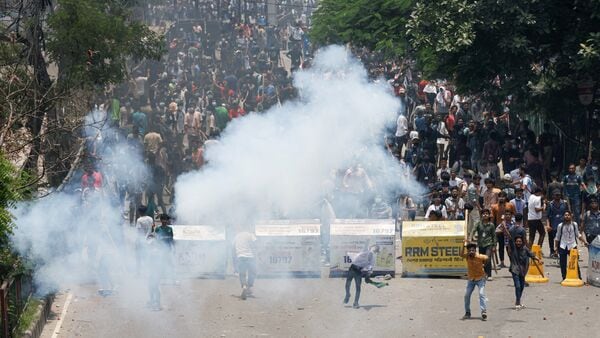The Indian government gave an advisory on Thursday to its citizens in Bangladesh after a big protest against quotas led to the death of six people and injured many others. India told its citizens and students in Bangladesh to stay indoors and avoid going out unless necessary because of the ongoing unrest, which has caused clashes between protesters and the police.
The Indian High Commission in Dhaka said in the advisory, “Due to the current situation in Bangladesh, Indian citizens and students living in Bangladesh should avoid traveling and limit their movements outside their homes.”
The Indian embassy also advised all Indian citizens in Bangladesh to follow this advisory and contact the High Commission or Assistant High Commissions if they need urgent help.
Recent unrest in Bangladesh
Bangladesh faces a significant challenge as student protests erupt across the nation. The unrest stems from recent changes to the government job quota system. On Thursday, protesters called for a nationwide shutdown of transportation and businesses. This action aims to pressure Prime Minister Sheikh Hasina to overhaul the current job allocation method.
The Bangladesh government responded by closing all public and private universities indefinitely. This decision followed a week of escalating demonstrations that turned violent, resulting in at least six deaths and over 400 injuries.
Background of Bangladesh’s Job Quota System
In Bangladesh, government jobs are highly sought after due to their stability and good pay. Each year, about 400,000 graduates compete for roughly 3,000 positions. Until 2018, 56% of these jobs were reserved for specific groups:
– 30% for descendants of 1971 Liberation War veterans
– 10% for women
– 10% for people from underdeveloped districts
– 5% for tribal communities
– 1% for persons with disabilities
This left only 44% of government job openings for general applicants.
The Freedom Fighter Quota
The freedom fighter quota, first introduced after Bangladesh’s independence, has been a point of contention. In 1977, the government extended this quota to include children of freedom fighters. In 2010, it was further expanded to include grandchildren of freedom fighters.
Recent Court Ruling and Protests
A recent High Court ruling on June 5, 2024, overturned a 2018 order that had removed all reservations. This decision, particularly reinstating the 30% freedom fighters’ quota, sparked fresh protests across Bangladesh.
Protesters’ Demands
Student protesters, led by those from Dhaka University, are calling for:
1. Recruitment based on merit
2. Reforms to the existing quota system
3. Limiting overall reservation to 5% for backward populations
4. Passing a bill in parliament to secure these changes
Violence Erupts
The protests in Bangladesh escalated into violent confrontations involving anti-quota protesters, the Bangladesh Chhatra League (BCL), and police forces. This unrest spread rapidly to major cities such as Dhaka, Rajshahi, Khulna, and Chattogram. Protesters took to blockading highways and railway routes, causing significant disruptions and bringing traffic to a halt in numerous areas across the country. The situation intensified as both sides clashed, leading to widespread chaos and increasing tensions. The large-scale nature of these protests and the aggressive tactics employed by protesters paralyzed many regions, reflecting deep-seated frustrations and a volatile atmosphere throughout Bangladesh.
Government Response
The government has taken several steps in response to the unrest:
1. Closing all high schools, colleges, madrasahs, and polytechnic institutes
2. Deploying Border Guard at various locations
3. Suspending mobile internet services
International Reaction to Bangladesh’s Unrest
Amnesty International has urged Bangladesh authorities to ensure the safety of peaceful protesters. The US State Department condemned the violence against demonstrators. India’s High Commission in Dhaka issued an advisory for Indians residing in Bangladesh, urging them to avoid travel and minimize movement due to the violent clashes.
As the country grapples with this crisis, the government faces pressure to find a solution that addresses the concerns of protesters while maintaining stability in the country. The ongoing unrest highlights the complex challenges Bangladesh faces in balancing job allocation, historical recognition, and the aspirations of its youth.
ALSO READ: Is Karnataka Government Trying to Introduce 100% Reservation?: The New Controvery!
